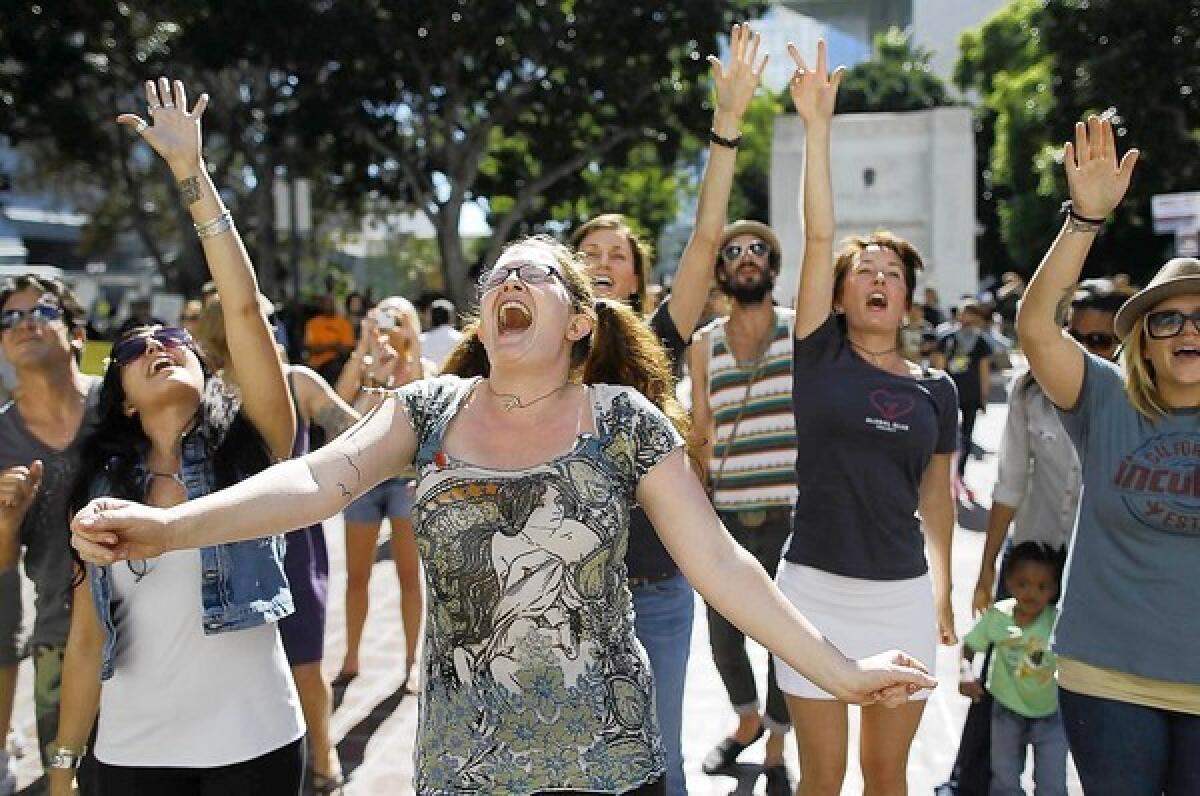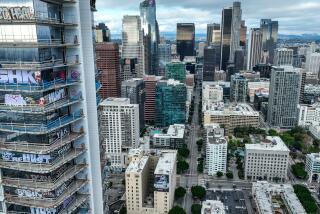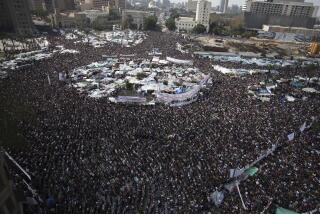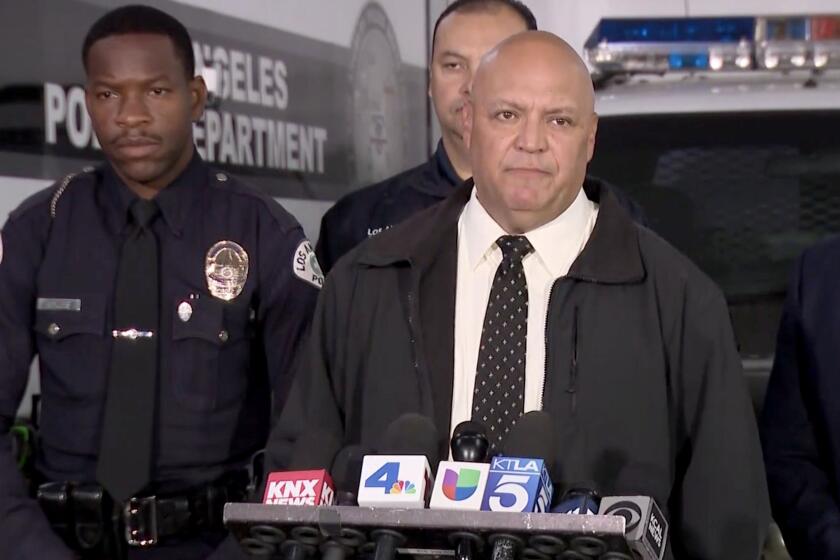A festival, a rebellion, an awakening

I pitched a tent Monday night in a neighborhood of the angry, the disaffected and the disillusioned.
“Are you aware that the sprinklers come on at night?” a fellow camper asked as I drove my tent stakes into the ground.
I wasn’t, but hey, a little personal discomfort is the price of revolution, right?
The media haven’t known quite what to make of the demonstrators who’ve taken to the streets in Los Angeles, New York and elsewhere. The occupiers have been knocked for not having a clear message, and they’ve been called the tea party of the left. But I wasn’t quite willing to write them all off because they weren’t able to speak in sound bites.
That’s why I decided to spend a night with Occupy Los Angeles on the grass skirt outside L.A. City Hall. And after an evening of observation and conversation, I can tell you this:
Occupy L.A. is a festival, a rebellion, an awakening, complete with a mess tent, economics classes, a silk screen printing shop, live music, a pumpkin patch and passionate conversation.
OK, it’s also a place to party on city property while the police, at least so far, look on benignly, and contact highs are easy to come by. My favorite sign:
“God Forbid We Have Sex ‘N Smoke Pot. They Want Us to Grab Guns ‘N Go to War!”
Will it grow into a cohesive movement? Who knows.
What I found was a collection of disaffected souls that included socialists and capitalists, atheists and religious zealots, youngsters and codgers. They have a lot of different targets, but most seem to be antiwar (“Drop Tuition, Not Bombs”), and they believe the middle-class and the poor are being crushed by scheming profiteers on Wall Street and in Washington.
After that, it gets a bit mushy; this isn’t yet anywhere near as focused as the civil rights movement or as fiery as the antiwar protests of the ‘60s, and it may never come close. But it’s a badly needed spark, and GOP presidential candidates Mitt Romney and Herman Cain added more fuel to the fire by back-handing the occupiers, with Cain calling them un-American.
“Corporate profits are at record highs. Mortgage foreclosures are at record highs,” one young man was saying to another, summarizing what for him is a snapshot of the 99% getting shafted by the 1%, in a country where commercial banks have already spent nearly $33 million this year on lobbying.
A lot of the rhetoric I heard wasn’t that succinct, particularly at the evening General Assembly, a nightly open-mike discussion of policy and purpose.
“Are they still on this topic? I’ve been gone an hour and they were talking about this when I left,” a middle-aged woman from Pacific Palisades asked me when she heard speakers debating the proper show of support for the fired employees at the remodeled Hotel Bel-Air.
Among the seemingly endless questions:
Should they call the former employees “workers” or “people”? How should they word their official position on the hotel workers? And should they officially stand with labor on principle or consider the recommendation of a dissenter who said, “Unions are just as corrupt as corporations.”
Of course they should stand with the workers, an exasperated young woman responded. The workers are the 99% who are ruled and oppressed by the 1% in American society, and that’s exactly with whom Occupy L.A. must stand.
Kwazi Nkrumah, a longtime activist and one of the organizers of Occupy L.A., acknowledges that the process of talking out issues can be tedious — at one point he took the microphone to announce that in the future, official positions on certain topics would be hammered out by a supercommittee rather than being endlessly discussed. But he’s pleased overall with how things are going.
“It’s very exciting to witness this,” said Nkrumah, who appreciates that so many youngsters are doing something other than staying home and watching television.
Nkrumah, 57, said he was following the news about Occupy Wall Street last month when he decided Los Angeles needed its own stage. He and Mario Brito, an unemployed union organizer, helped organize the occupation, and Nkrumah liked City Hall as a location because he wanted a conversation in the town square.
“I said the first night if we had 500 people march and 50 camp out, I’d be happy,” said Brito. “It was about 5,000 marchers and 100 camping out.”
Going forward, though, Nkrumah said, the demonstrators will need to plan more specific “actions” such as marches and occupations at the doorsteps of the region’s financial behemoths if they want to have a real impact. And they need to recruit far more people to the cause — enough to begin influencing public policy in the coming months and years. Campaign finance reform, limits on foreclosures, higher taxes on the 1%, greater investment in education, and economic and social justice — those are the goals.
Kat Knox-Davies, a 21-year-old Westwood resident and book shop clerk who moved into a tent on the first day and hasn’t left, thinks the protests have a future.
“This is a lot of people waking up at the same time, and the start of a very long movement,” she said. For her, many of the nation’s economic and political problems can be pegged to one thing:
“Corporate influence in government.”
I’m happy to report that the sprinklers did not go on. But that doesn’t mean that sleep came easily. After I crawled into my tent some time after 1 a.m., I could still hear the voices of revolution all around me.
In the morning, I limbered up with a stroll around the block reading signs: “We Are Not Overthrowing a Democracy, We Are Restoring One,” said one. Another quoted Steve Jobs: “The People Who Are Crazy Enough to Think They Can Change the World Are the Ones That Do.”
Along the way I bumped into Brito, who was rested and ready to fight again. The movement is young, he told me, and it’ll take a while to coalesce.
“It’s messy,” he said. “It’s democracy.”
More to Read
Start your day right
Sign up for Essential California for news, features and recommendations from the L.A. Times and beyond in your inbox six days a week.
You may occasionally receive promotional content from the Los Angeles Times.







